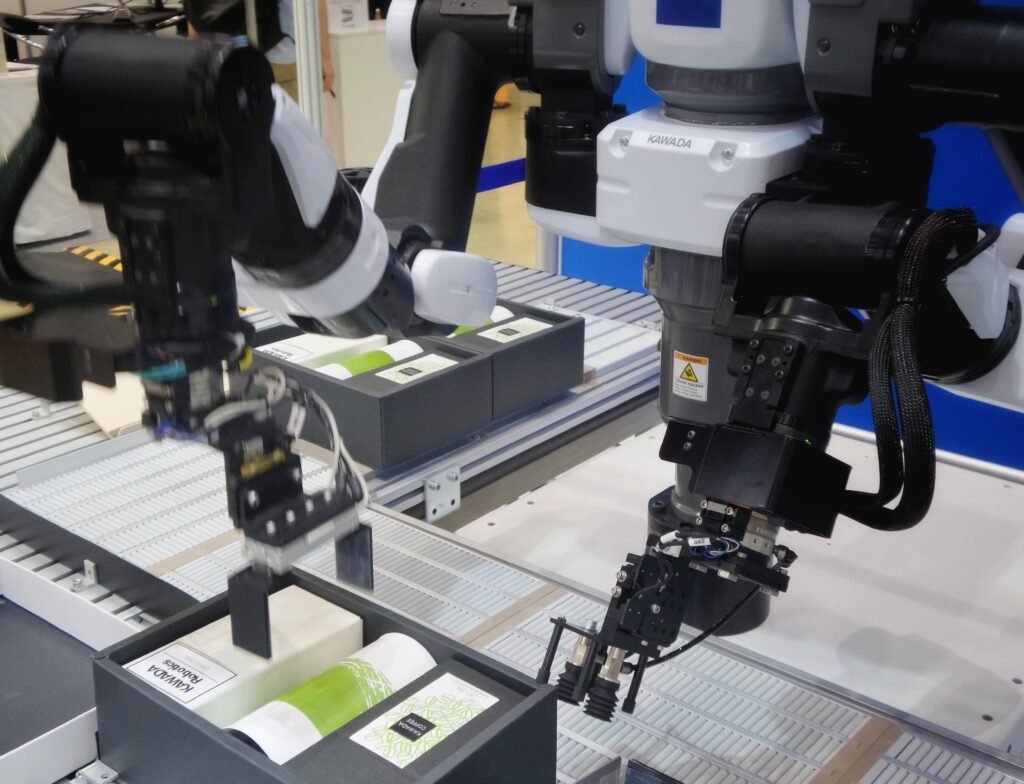Artificial Intelligence (AI) has rapidly become an integral part of our everyday lives, impacting various industries and sectors in ways we may not even realize. From voice assistants on our smartphones to predictive algorithms used by online retailers, AI technology is revolutionizing how we interact with technology and shaping the future of numerous fields. In healthcare, AI is transforming diagnoses and treatment plans, while in finance, it helps identify fraud and make data-driven investment decisions. The potential applications of artificial intelligence are vast and continually expanding, making it a fascinating and essential area of study and development in the modern world.
Transportation
Self-driving cars
Artificial intelligence (AI) plays a crucial role in the development and operation of self-driving cars. Through the use of machine learning algorithms, self-driving cars are able to analyze vast amounts of data from sensors, cameras, and other sources to make informed decisions on the road. AI enables the cars to interpret traffic signs, detect obstacles, and predict the behavior of other drivers, ultimately ensuring a safer and more efficient driving experience for everyone.
With the advancement of AI, self-driving cars have the potential to revolutionize transportation. They have the ability to reduce human error, which is the leading cause of accidents on the road. By eliminating the need for human drivers, self-driving cars have the potential to dramatically decrease traffic congestion and improve overall road safety. Additionally, self-driving cars can provide mobility options to those who are unable to drive themselves, such as the elderly or disabled individuals.
Traffic prediction and optimization
Another area where AI is making a significant impact in transportation is traffic prediction and optimization. By analyzing historical traffic data, AI algorithms can accurately predict traffic patterns, congestion points, and optimal routes. This information can be used to develop intelligent traffic management systems that can help reduce congestion and improve traffic flow.
AI can also be used to optimize transportation networks by dynamically adjusting traffic signals based on real-time traffic conditions. By adapting traffic signal timings to reduce congestion and prioritize traffic flow, AI can improve travel times and reduce fuel consumption. Furthermore, AI can be used to optimize transportation routes for logistics and delivery purposes, ensuring that goods and services are delivered in the most efficient and cost-effective manner.
Overall, the use of AI in transportation has the potential to revolutionize the way we travel and significantly improve safety, efficiency, and sustainability on the roads.
Healthcare
Medical diagnosis
AI is increasingly being used in the field of medical diagnosis to assist doctors and healthcare professionals in analyzing medical images, such as X-rays, CT scans, and MRI scans. Through the use of computer vision algorithms, AI can detect subtle patterns and anomalies in medical images that may be missed by the human eye. This can potentially help in the early detection and diagnosis of diseases, leading to more effective treatments and improved patient outcomes.
AI can also aid in medical diagnosis by analyzing vast amounts of patient data, including medical records, lab results, and genetic information. By identifying patterns and correlations in this data, AI algorithms can provide valuable insights into disease diagnosis and prognosis. This can help healthcare professionals make more accurate and informed decisions, leading to personalized and targeted treatment plans for patients.
Drug discovery
The process of drug discovery is time-consuming, complex, and costly. AI has the potential to expedite this process by predicting the effectiveness of drugs and identifying potential drug targets. Through the analysis of vast amounts of biological and chemical data, AI algorithms can identify patterns and make predictions on drug efficacy and toxicity.
AI can also assist in the discovery of new drugs by identifying novel drug targets and simulating the effects of different compounds on these targets. This can help in the development of new and more effective treatments for various diseases.
Furthermore, AI can aid in the identification and prediction of adverse drug reactions by analyzing patient data and identifying risk factors. This can help in the development of safer medications and reduce the occurrence of adverse events.
Patient monitoring and care
AI technologies are increasingly being used for patient monitoring and care, both in hospital settings and at home. Through the use of wearable devices and sensors, AI algorithms can continuously monitor vital signs, such as heart rate, blood pressure, and oxygen levels, and alert healthcare professionals of any abnormalities or potential risks.
AI can also be used to analyze patient data, such as electronic health records and patient-reported symptoms, to provide personalized and targeted care plans. By identifying patterns and correlations in this data, AI algorithms can assist in the early detection and prevention of diseases, help in the management of chronic conditions, and improve overall patient outcomes.
Additionally, AI-powered virtual assistants and chatbots can provide patients with 24/7 access to medical information and support. These AI-powered tools can answer common medical questions, provide medication reminders, and offer guidance on self-care and symptom management.

Finance
Fraud detection
Fraud is a significant concern in the financial industry, costing businesses and consumers billions of dollars each year. AI is playing a crucial role in fraud detection by analyzing vast amounts of financial data and identifying patterns and anomalies that may indicate fraudulent activity. Through the use of machine learning algorithms, AI can learn from historical data and adapt to new fraud techniques, enhancing its ability to detect and prevent fraudulent transactions.
AI can analyze various types of data, including transaction history, customer behavior, and external data sources, to identify potential fraud in real-time. By flagging suspicious transactions and generating alerts, AI can assist financial institutions in preventing financial losses and protecting their customers from fraudulent activities.
Automated trading
AI is also transforming the financial industry through the automation of trading activities. AI algorithms can analyze vast amounts of financial data, such as market trends, news articles, and social media sentiment, to make informed trading decisions in real-time. By continuously monitoring and analyzing market conditions, AI-powered trading systems can execute trades at high speeds and take advantage of profitable opportunities.
Automated trading can improve trading efficiency and reduce transaction costs by eliminating human emotions and biases from the trading process. AI-powered trading systems can execute trades based on predefined strategies and rules, maximizing profit potential and minimizing the risk of human error.
Furthermore, AI algorithms can continuously learn and adapt to market conditions, enhancing their ability to make accurate predictions and improve trading performance over time.
Retail
Recommendation systems
AI-powered recommendation systems are becoming ubiquitous in the retail industry. By analyzing customer data, such as purchase history, browsing behavior, and product reviews, AI algorithms can generate personalized recommendations that are tailored to each individual customer’s preferences and needs.
These recommendation systems can significantly enhance the customer experience by providing relevant and engaging product suggestions. By understanding customer preferences and predicting future needs, AI-powered recommendation systems can increase customer satisfaction, drive repeat purchases, and improve overall sales performance.
Furthermore, AI-powered recommendation systems can assist retailers in optimizing inventory management by predicting demand and adjusting stock levels accordingly. This can help retailers minimize stockouts and overstock situations, leading to a more efficient supply chain and reduced costs.
Inventory management
AI can revolutionize inventory management in the retail industry by optimizing stock levels and improving demand forecasting. AI algorithms can analyze historical sales data, market trends, and external factors, such as weather patterns, to predict future demand accurately. This can help retailers optimize their inventory levels, reduce inventory holding costs, and avoid stockouts or overstock situations.
Moreover, AI-powered inventory management systems can automate the replenishment process by generating purchase orders based on demand forecasts and predefined inventory policies. By eliminating manual tasks and streamlining the supply chain, AI can improve operational efficiency, reduce costs, and enhance customer satisfaction.
By leveraging AI technologies in areas such as recommendation systems and inventory management, retailers can gain a competitive edge in a rapidly evolving market and deliver a personalized and seamless shopping experience to their customers.

Customer Service
Chatbots
One of the most visible applications of AI in customer service is the use of chatbots. Chatbots are AI-powered virtual assistants that can understand and respond to customer inquiries and requests in real-time. They can be employed across various channels, including websites, mobile apps, and messaging platforms, providing customers with immediate assistance and support.
Chatbots can handle a wide range of customer inquiries, including frequently asked questions, product information, and order tracking. By leveraging natural language processing algorithms, chatbots can understand the context and intent behind customer queries and provide relevant and accurate responses. This can help reduce response times, improve customer satisfaction, and free up human customer service representatives to handle more complex issues.
Furthermore, chatbots can continuously learn and improve their performance by analyzing customer interactions and feedback. By identifying patterns, common issues, and customer preferences, chatbots can enhance their ability to provide personalized and effective support.
Virtual assistants
In addition to chatbots, AI-powered virtual assistants are becoming increasingly prevalent in customer service. Virtual assistants, such as Amazon’s Alexa and Apple’s Siri, can understand natural language commands and perform a wide range of tasks, including answering questions, scheduling appointments, and making recommendations.
Virtual assistants can provide personalized and proactive assistance by analyzing user preferences, habits, and contextual information. For example, a virtual assistant may remind a customer about an upcoming appointment, suggest personalized product recommendations, or provide real-time updates on the status of an order.
By leveraging AI technologies, virtual assistants can enhance the customer service experience by providing seamless and efficient support across multiple channels. They can offer 24/7 access to information and assistance, improve self-service capabilities, and ultimately, enhance customer satisfaction and loyalty.
Manufacturing
Quality control
AI is transforming the field of manufacturing by enhancing quality control processes. Through the use of computer vision algorithms, AI can detect defects and anomalies in products and materials with high accuracy and speed.
AI-powered quality control systems can analyze images, videos, and sensor data to identify deviations from specified quality standards. By comparing products against reference images or predefined criteria, AI can detect defects, such as scratches, dents, or color variations, that may be missed by human operators. This can help manufacturers ensure that only high-quality products are delivered to customers, reducing rework, waste, and customer complaints.
Furthermore, AI can analyze real-time production data to identify patterns and trends that may indicate potential quality issues. By providing early warnings and alerts, AI-powered quality control systems can help manufacturers take proactive measures to prevent defects and improve overall product quality.
Robotic process automation
AI is also revolutionizing manufacturing through the use of robotic process automation (RPA). RPA involves the use of AI-powered robots or software bots to automate repetitive and manual tasks in the manufacturing process.
RPA can be utilized in various areas of manufacturing, such as assembly, packing, and inspection. By automating these tasks, RPA can improve operational efficiency, reduce errors, and free up human workers to focus on more complex and value-added activities.
Moreover, AI-powered robots can learn from human operators and adapt to changes in the manufacturing environment. Through the use of machine learning algorithms, robots can continuously improve their performance, enhance process optimization, and achieve higher levels of productivity.
By leveraging AI technologies, manufacturers can streamline their operations, increase productivity, and deliver high-quality products in a cost-effective and efficient manner.

Education
Adaptive learning programs
AI is transforming education through the development of adaptive learning programs. These programs leverage AI algorithms to personalize the learning experience for each individual student, taking into account their strengths, weaknesses, and learning preferences.
By analyzing student performance data, such as test scores, assignments, and participation in classroom activities, AI algorithms can identify areas of improvement and tailor the educational content and activities accordingly. This can help students learn at their own pace and in a way that suits their individual needs, enhancing their understanding and retention of the material.
Furthermore, adaptive learning programs can provide immediate feedback and support to students, helping them address misconceptions and fill knowledge gaps in real-time. This can enhance student engagement, motivation, and overall learning outcomes.
Virtual tutors
AI-powered virtual tutors are also transforming the way students learn and interact with educational content. Virtual tutors can provide personalized instruction, guidance, and support to students, addressing their individual learning needs and adapting to their progress.
Virtual tutors can incorporate various AI technologies, such as natural language processing and machine learning, to provide interactive and engaging learning experiences. They can explain complex concepts, answer student questions, and provide real-time feedback and guidance.
Furthermore, virtual tutors can continuously analyze student data and track their progress, enabling educators to monitor student performance, identify areas of improvement, and tailor their teaching strategies accordingly.
By leveraging AI technologies, adaptive learning programs and virtual tutors have the potential to transform education by providing personalized and interactive learning experiences to students, enhancing their engagement and academic achievement.
Marketing
Targeted advertising
AI is revolutionizing the field of marketing by enabling targeted advertising campaigns. By analyzing vast amounts of customer data, including demographics, browsing behavior, and purchase history, AI algorithms can identify patterns and trends that allow marketers to target specific segments of the population with relevant and personalized advertisements.
AI can analyze customer data to segment audiences based on characteristics such as age, gender, interests, and preferences. By understanding these audience segments, marketers can create tailored advertisements that resonate with customers and drive higher engagement and conversion rates.
Furthermore, AI can continuously learn and adapt to customer behavior, helping marketers optimize their advertising campaigns for maximum effectiveness. By analyzing the success of previous campaigns and adjusting targeting criteria and messaging accordingly, AI-powered advertising systems can improve campaign ROI and drive business growth.
Content creation
AI is also playing a significant role in content creation and curation. AI algorithms can generate written content, such as news articles, product descriptions, and social media posts, with high accuracy and speed. This can help marketers automate content creation processes, reduce time and cost, and increase content distribution across various platforms.
AI-powered content generation systems can analyze vast amounts of data, including text, images, and videos, to identify patterns and generate content that is relevant, engaging, and tailored to the target audience. By leveraging natural language processing and machine learning algorithms, AI can mimic human writing styles and adapt its content based on user feedback and preferences.
Furthermore, AI can assist marketers in content curation by analyzing customer data and selecting relevant and personalized content recommendations. By understanding customer preferences and interests, AI-powered content curation systems can enhance engagement, increase customer loyalty, and drive conversions.
By leveraging AI technologies in targeted advertising and content creation, marketers can effectively reach their target audience, deliver personalized content, and maximize the impact of their marketing efforts.
Cybersecurity
Threat detection
AI is increasingly being used in cybersecurity to detect and prevent cyber threats. AI algorithms can analyze vast amounts of network data, including user behavior, network traffic, and system logs, to identify unusual patterns and detect potential security breaches.
By leveraging machine learning algorithms, AI can learn from historical data and adapt to new and evolving cyber threats. This enables AI-powered cybersecurity systems to continuously monitor and analyze network activity, detect anomalies, and generate alerts in real-time. By identifying suspicious activities, such as unauthorized access attempts or unusual data transfers, AI can help security teams respond quickly and effectively to potential threats.
Furthermore, AI can assist in threat intelligence by analyzing external data sources, such as threat feeds and vulnerability databases, to identify emerging threats and vulnerabilities. By providing valuable insights and proactive threat mitigation strategies, AI-powered cybersecurity systems can enhance an organization’s overall security posture and protect against cyberattacks.
Anomaly detection
Anomaly detection is another important application of AI in cybersecurity. AI algorithms can analyze system logs, network traffic, and other data sources to identify abnormal behaviors or deviations from normal patterns. By flagging potential anomalies, AI-powered systems can help security teams identify and investigate potential security incidents.
AI-powered anomaly detection systems use machine learning algorithms to learn from historical data and establish baseline behavior for various system components and user activities. Any deviations from these baselines can be considered potential anomalies and trigger an alert.
Anomaly detection can help organizations detect and respond to various security threats, such as insider attacks, malware infections, and system misconfigurations. By providing early warnings and alerts, AI-powered systems can help security teams take proactive measures to mitigate risks, minimize the impact of security incidents, and ensure the overall security of the organization’s systems and data.
Entertainment
Recommendation engines
AI-powered recommendation engines are transforming the entertainment industry by providing personalized content recommendations to users. Through the analysis of user preferences, behaviors, and historical data, AI algorithms can recommend movies, TV shows, music, and other forms of entertainment that align with each individual’s tastes and interests.
Recommendation engines can significantly enhance the user experience by reducing the time and effort required to find relevant and engaging content. By leveraging machine learning algorithms, recommendation engines can learn from user feedback and adapt their recommendations over time, continually improving the accuracy and relevance of their suggestions.
Moreover, recommendation engines can help content providers deliver personalized recommendations across various platforms and channels, enhancing user engagement, increasing customer satisfaction, and driving revenue through increased consumption and customer loyalty.
Content curation
AI is also playing a significant role in content curation in the entertainment industry. AI algorithms can analyze vast amounts of content, including articles, videos, and social media posts, to identify trending topics, popular content, and user preferences.
Through the use of natural language processing and machine learning algorithms, AI-powered content curation systems can gather, filter, and organize content based on relevancy, popularity, and user interests. This enables content providers to deliver personalized and engaging content experiences to their users, enhancing their satisfaction and ensuring continuous consumption.
Moreover, AI-powered content curation systems can help content providers improve content discovery by suggesting related articles, videos, or artists based on user preferences and behavior. By facilitating content exploration and providing relevant recommendations, AI can drive user engagement, extend session duration, and increase the overall consumption of content.
By leveraging AI technologies in recommendation engines and content curation, the entertainment industry can deliver personalized and engaging experiences to users, ensuring their satisfaction and loyalty.






